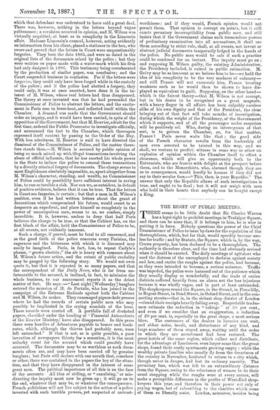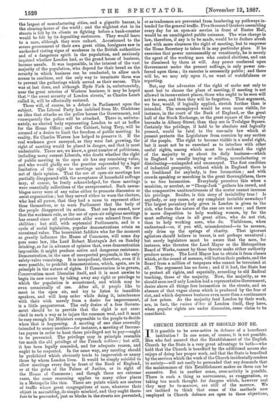THE RIGHT OF PUBLIC MEETING.
THERE seems to be little doubt that Sir Charles Warren has a legal right to prohibit meetings in Trafalgar Square, and there can be none that, if it belongs to him, be is wise in putting it in force. Nobody questions the power of the Chief Commissioner of Police to issue by-laws for the regulation of the thoroughfares, which, but for that, would speedily become use- less for traffic ; and by Statute, the Square, which is, by the way, Crown property, has been declared to be a thoroughfare. The authority is therefore clear, and the time had obviously arrived when it should be exerted. The daily meetings of agitators who used the distress of the unemployed to declaim against society and law, and excite the roughs against the police, had become, as they were intended to become, a serious nuisance. Traffic was impeded, the police were harassed out of the patience which they usually display so wonderfully, and the trade of entire districts suffered heavily from an alarm not the less injurious because it was wholly vague, and in part at least unfounded. The shopkeepers round the Square, in the Strand, in Piccadilly, in Regent Street, in Bond Street, in Oxford Street, and in the con- necting streets—that is, in the richest shop district of London —found their receipts heavily falling away. Respectable trades- men estimate the reduction in "takings " at 50 per cent., and even if we consider that an exaggeration, a reduction of 20 per cent, is, especially to the great shops, a most serious blow. The customers of the dealers in luxuries can wait, and abhor noise, insult, and disturbance of any kind, and large numbers of them stayed away, waiting until the order to which they are accustomed had been restored. The great hotels of the same region, which collect and distribute, for the advantage of Londoners, even larger sums than the great shops, found their costly apartments growing empty; while the wealthy private families who usually fly from the dreariness of the country in November, hesitated to return to a city which, though never in danger, had lost its ordinary amenity. The pecaniary loss, which was felt to an extraordinary distance from the Square, owing to the reluctance of women to do their usual shopping while the roughs were at every corner, will make a perceptible difference in the profits of West-End shop- keepers this year, and therefore in their power not only of paying wages, but of subscribing to the charities which some of them so liberally assist. London, moreover, besides being
the largest of manufacturing cities, and a gigantic bazaar, is the clearing-house of the world ; and the slightest riot in its streets is felt by its clients as fighting before a bank-counter would be felt by its depositing customers. They would leave to a man, although they were unhurt. Accustomed to the severe government of their own great cities, foreigners saw in unchecked rioting signs of weakness in the British authorities and of a dangerous spirit in the population, and anxiously inquired whether London had, as the grand house of business, become unsafe. It was impossible, in the interest of the vast majority of the population, who depend for their bread on the security in which business can be conducted, to allow such
scenes to continue, and the only way to terminate them was
to prevent the gatherings which served as their excuse. This was at last done, and although Hyde Park is, uufortunately, near the great arteries of Western business, it may be hoped that "the sweet security of London streets," as Charles Lamb called it, will be effectually restored. There will, of course, be a debate in Parliament upon the subject. The Liberal Party has imbibed from Mr. Gladstone an idea that attacks on the police harass the Government, and consequently the police will be attacked. There is, unforta- stately, no elected body representing London to net as buffer for the Home Office ; and the Cabinet, being Tory, will be accused of a desire to limit the freedom of public meeting. In 'reality, Sir Charles Warren has helped to preserve it. If the real workmen grew annoyed, as they were fast growing, the right of meeting would be placed in danger, and that is most undesirable. There are, we know, a great number of politicians, including many earnest Liberals, who doubt whether the right of public meeting in the open air has any remaining value, and who would gladly see the practice superseded by a legal limitation of the right to meetings under cover. We are not of their opinion. That the use of open-air meetings has partially disappeared with the acceptance of household suffrage may, of course, be freely acknowledged, for those meetings were essentially collections of the unrepresented. Such assem- blages never were of any value either to promote discussion or moist organisation ; but they served either to warn the electors, who had all power, that they had a mass to represent other than themselves, or to warn Parliament that the body of the people disapproved its action. That use has ceased, now that the workmen role, as the use of open-air religious meetings has ceased since all professions alike were released from dis- abilities ; but still, with septennial Parliaments, and in a cycle of social legislation, popular demonstrations retain an occasional value. The benevolent faddists who for the moment so greatly influence the House of Commons, will some day pass some law, like Lord Robert Montagu's Act on Sunday drinking, so far in advance of opinion that, were demonstration impossible, it might produce active and dangerous resistance. Demonstration, in the case of unexpected proposals, is the only safety-valve remaining. It is inexpedient, therefore, even if it were possible, to prohibit demonstrations, which, again, are in principle in the nature of rights. If Conservatism is to govern, Conservatism must liberalise itself, and it is most unwise to begin its new course by taking away any right or privilege to which the population is accustomed, and which may be
even occasionally of use. After all, if people like to meet in the open air, and try to listen to inaudible speakers, and will keep order while doing it, interference with their wish merely from a desire for improvement, is a little preposterous. The only desire of a free Govern- ment should be to provide that the right is not exer- cised in such a way as to injure the common weal, and it must be easy enough for Ministers responsible to the people to decide when that is happening. A meeting of one class avowedly intended to annoy another—for instance, a meeting of Income- tax payers in order to hoot those privileged not to pay—ought to be prevented. The privilege may in principle resemble too much the old privilege of the French noblesse; but still, it has been legally conceded, and for adequate reason, and ought to be respected. In the same way, any meeting should be prohibited which obviously tends to impoverish or annoy those by whom London lives. It would be simply suicidal to 41.10W meetings every day in front of the Bank of England, or at the gates of the Palace of Justice, or in eight of the House of Commons ; and though those are extreme cases, the same reasoning applies to many other places in a Metropolis like this. There are points which are centres of traffic where great congregations of men, whatever their object in assembling, do simple mischief, and they ought there- fore to be prevented, just as blocks in the streets are prevented,
or as tradesmen are prevented from lumbering up pathways in- tended for the general traffic. Five thousand Quakers assembling every day for an open-air service in front of Exeter Hall, would be an unmitigated public nuisance. The wise change in law, therefore, if any is to be made, would be to declare afresh
and with more clearness the right of meeting, but to empower the Home Secretary to taboo it in any particular place. If he exercises that power unreasonably or vexatiously, he is merely the agent of the working men who control elections, and can be dismissed by them at will. Any power conferred upon Government under the present suffrage, is only power con- ferred upon them ; its exercise is necessarily public ; and there will be, we may rely upon it, no want of watchfulness or reporting.
But, say the advocates of the right of mobs not only to meet but to choose the place of meeting, if meeting is not allowed in inconvenient places, those who ought to be seen will not be seen, and then they will be forgotten. That argument, we fear, would, if logically applied, stretch further than is intended. The unemployed would be even more visible, for instance, in the court of the Bank of England, or the great hall of the Stock Exchange, or the great square of the cavalry barracks in Albany Street, than they are in Trafalgar Square. Certainly the privilege, if held to be absolute and logically pressed, would be fatal to the one-mile law which at present protects the Legislature from coercion by any section of the people. The right to become visible is a useful right, but it must not be so exercised as to interfere with other useful rights, among which must be reckoned the right of the majority to go about its daily business—which in England is usually buying or selling, manufacturing or distributing—unimpeded and unannoyed. The first condition of industrial prosperity, without which in England there is no livelihood for anybody, is free locomotion ; and with crowds speaking or marching in the great thoroughfares, there is no free locomotion. Everybody perceives this when a musician, or acrobat, or " Cheap-Jack " gathers his crowd, and the comparative unattractiveness of the orator cannot increase his privilege. Besides, is this story of invisibility true ? Is anybody, or any cause, or any complaint invisible nowadays? The largest pecuniary help given in London is given to the sick, who from the nature of the case are not seen ; and there is more disposition to help working women, by far the most suffering class in all great cities, who do not riot, than to help working men, who do. Visibleness, when understood—or, if you will, misunderstood—to be menace, only dries up the springs of charity. That ignorant agitators should believe in terror, is not perhaps unnatural ; but surely legislators must be aware that the men, for instance, who threaten the Lord Mayor or the Metropolitan Board of Works, cannot by those threats make either authority produce money. The Lord Mayor has to obtain it from classes which, at the sound of menace, will button their pockets, and the Board from a million of taxpayers who cannot be terrorised at all. The argument has no force ; and if it had, the State has to protect all rights, and especially, according to old Radical teaching, those of the majority. Now, the majority, as we should soon see if only London had a representative Government, desire above all things free locomotion in the streets, and an absence of that vague alarm which is produced by the fear of riot, and which depresses bnsiness even more than a continuance of low prices. As the majority feed London by their work, are, in fact, the raison d'être of London itself, they have, when popular rights are under discussion, some claim to be considered.












 Previous page
Previous page